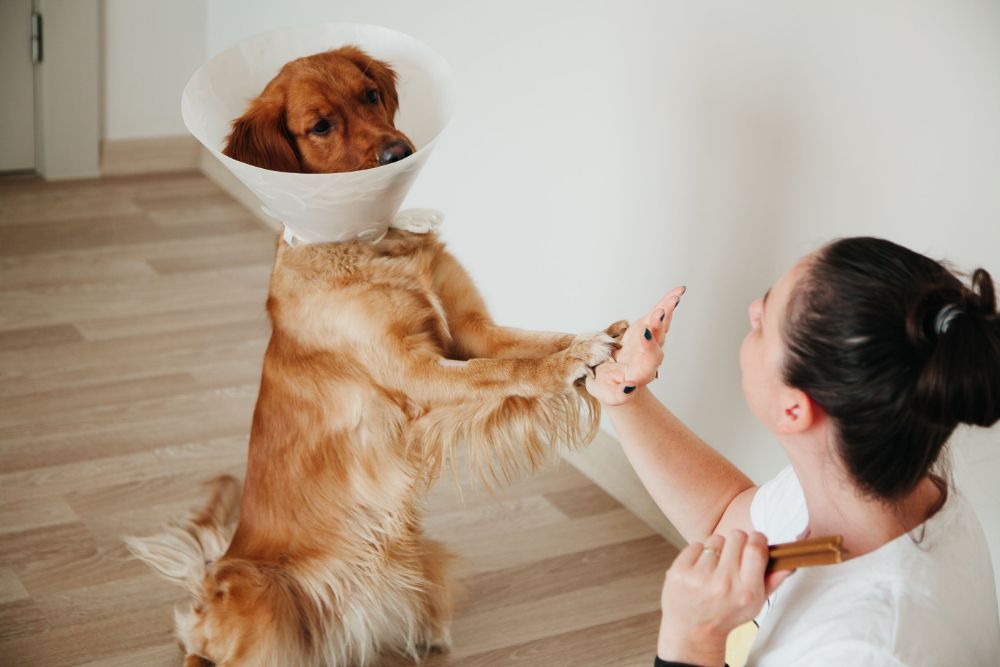
The Benefits of Spaying a Dog
February 23, 2021Whether you’ve recently adopted a pet or you’re considering it, one of the most important health decisions you’ll make is to spay or neuter your cat or dog.
Benefits of Spaying or Neutering Your Dog
- Spaying offers lifelong health benefits. Spaying helps prevent uterine infections and breast cancer, which is fatal in 50% of dogs and 90% of cats. Neutering male pets can prevent testicular cancer if done before pets are six months and older. On top of preventing disease, spaying and neutering also protect your pets from unwanted and unplanned litters!
- By removing the ovaries and uterus of a female pet, they will not go into heat.
- Female cats usually go into heat for four to five days every three weeks during the breeding season. They “advertise” for mates by yowling and urinating more frequently, and sometimes all over the house. So by spaying them, they (and you) won’t have to go through this misery every few weeks.
- Female dogs go into heat on average twice a year for two to four weeks each time and exhibit undesirable behaviors, including messy discharge.
- Neutering or removing the testicles of your male dog or cat will vastly improve your pet’s behavior and keep him close to home.
- An intact (un-neutered) male will do just about anything to find his new mate! That includes digging his way under fences or dashing out the door to escape from the house.
- Un-neutered males will also mark their territory by spraying strong-smelling urine all over the house.
When to Spay a Dog?
- For dogs: While the traditional age for neutering is six to nine months, puppies as young as eight weeks old can be neutered as long as they’re healthy. Dogs can be fixed as adults as well, although there’s a slightly higher risk of post-operative complications in older dogs, dogs that are overweight, or dogs that have health problems.
- It is generally considered safe for cats as young as eight weeks old to be spayed or neutered. In animal shelters, surgery is often performed at this time so that kittens can be sterilized before adoption. To avoid the start of urine spraying and eliminate the chance for pregnancy, it’s advisable to schedule the surgery before your cat reaches five months of age. It’s possible to spay a female cat while she’s in heat.
Are there risks to spaying and neutering?
As with any other surgeries, yes, there are some risks. While both spaying and neutering are major surgical procedures, veterinarians are also the most common surgeries on cats and dogs. Like any surgical procedure, sterilization is associated with some anesthetic and surgical risk, but the overall incidence of complications is very low.
Before the procedure, your pet will have a thorough physical examination to ensure that he/she is in good health. General anesthesia is administered to perform the surgery, and medications are given to minimize pain.
Help to Prevent Overpopulation
One of the biggest benefits of spaying and neutering is to prevent overpopulation of animals. Every year, millions of cats and dogs of all ages and breeds are euthanized at animal shelters or suffer as strays. These high numbers result from unplanned and unwanted litters that could have been prevented by spaying and neutering.
How Salmon Oil for Dogs Can Help After Spaying/Neutering
Salmon oil can be beneficial for dogs after spaying, although its benefits are not directly related to the spaying procedure itself. Here are a few ways salmon oil can support your dog's health during the recovery period after spaying:
-
Anti-inflammatory properties: Salmon oil contains omega-3 fatty acids, particularly EPA, which have natural anti-inflammatory properties. After spaying, your dog may experience some inflammation in the surgical site. Omega-3 fatty acids can help reduce this inflammation and promote faster healing.
-
Skin and coat health: Spaying surgery involves making an incision on the dog's abdomen, which may result in temporary hair loss or changes in the coat texture. Salmon oil's omega-3 fatty acids can support skin health, promote hair regrowth, and improve the overall appearance of your dog's coat.
-
Immune system support: The omega-3 fatty acids in salmon oil can help boost your dog's immune system. After surgery, the immune system plays a crucial role in fighting off potential infections and aiding in the healing process. By supporting the immune system, salmon oil can enhance your dog's overall recovery.
-
Cognitive support: While not directly related to the spaying procedure, omega-3 fatty acids have been shown to have cognitive benefits for dogs. They can support brain health, improve cognitive function, and contribute to better overall mental well-being.
It's important to note that while salmon oil can provide these benefits, it should be used as part of a balanced diet and in consultation with your veterinarian. Your vet can guide you on the appropriate dosage and duration of salmon oil supplementation based on your dog's specific needs and health condition.
Remember to always consult with your veterinarian for specific advice regarding your dog's post-spaying care, including any dietary recommendations or supplements.
